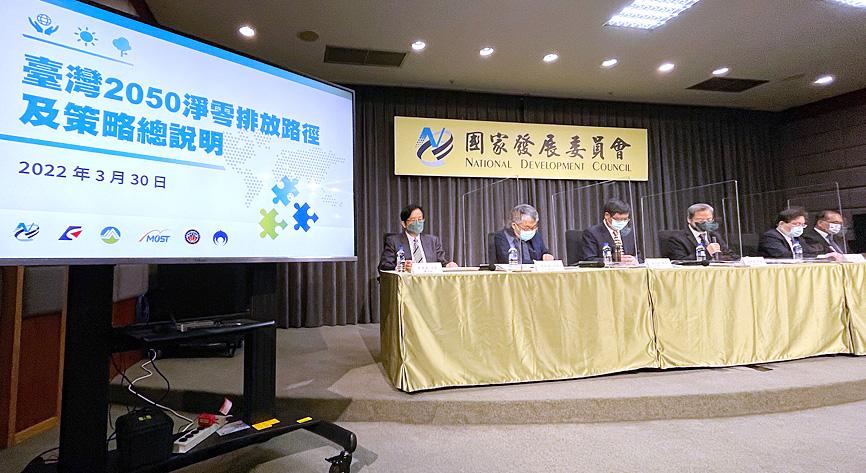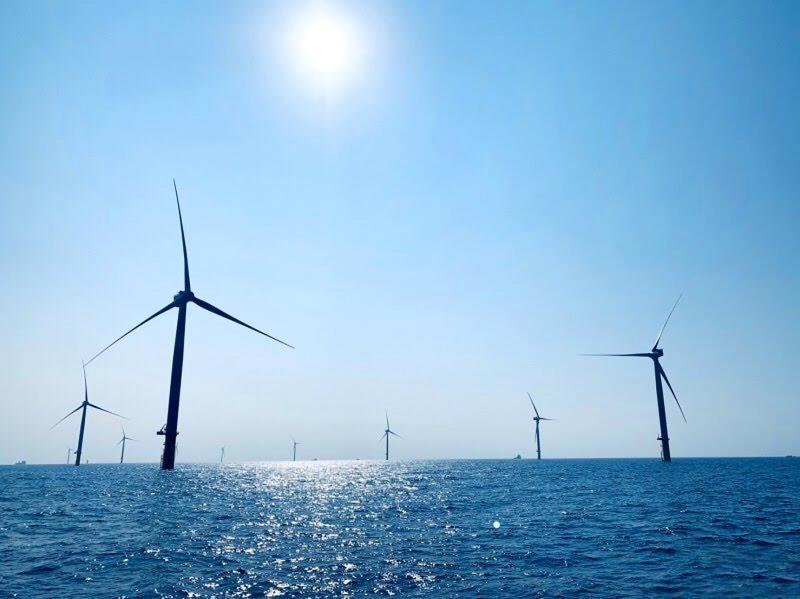The National Development Council (NDC) yesterday unveiled a road map for Taiwan’s push to become “carbon neutral,” with sources of renewable energy to account for at least 60 percent of the nation’s energy mix, which would exclude nuclear power.
NDC Minister Kung Ming-hsin (龔明鑫) said there is no need to worry about electricity shortages or a lack of green energy during the transition.
The nation is capable of increasing electricity supply by 2 percent each year, sufficient for companies to expand their operations, Kung said.

Photo: Liu Hsin-de, Taipei Times
He confirmed plans to impose a carbon tax to subsidize the development of green energy sources and purchases of electric vehicles, among other things.
However, the government would give companies time to gain better understanding of the initiative and make adjustments before introducing the carbon tax, Kung said, adding that it would set aside some green energy resources for small and medium-sized enterprises to purchase.
Heavy users of electricity, such as Taiwan Semiconductor Manufacturing Co (台積電), have inked deals to buy green energy to be developed by local suppliers for the next 20 years, the council said.

Photo: Lo Chi, Liberty Times
Technology titan Apple Inc requires companies in its supply chain to support the carbon neutral policy, it said.
The government would earmark NT$900 billion (US$31.49 billion) from this year to 2030 to pursue the policy goal, including NT$210.7 billion to be used to develop renewable and hydrogen energy sources, NT$207.8 billion to build smart grids and storage facilities, NT$128 billion to replace conservation equipment and NT$168.3 billion to promote electric vehicles, the council said.
State-run businesses would contribute NT$440 billion and the undertaking might induce an additional NT$4 trillion of private investment, it said.
“We aim to raise the ratio of electric transportation tools in the hope that electric buses will make up 100 percent of street buses by 2030,” Kung said, adding that he expects all private vehicles for sale in the local market to be electric by 2040.
The government has no intention to ban non-electric vehicles, but would use subsidies to promote electrification, he said.
It would start with government-owned vehicles and extend the practice to taxis and other areas, he said.
The government plans to review its road map every five years, as ever-changing technologies warrant a diversified approach, he said.
The council is to release more details this year on how it intends to cut carbon emissions by 2030, Kung said.

ENDEAVOR MANTA: The ship is programmed to automatically return to its designated home port and would self-destruct if seized by another party The Endeavor Manta, Taiwan’s first military-specification uncrewed surface vehicle (USV) tailor-made to operate in the Taiwan Strait in a bid to bolster the nation’s asymmetric combat capabilities made its first appearance at Kaohsiung’s Singda Harbor yesterday. Taking inspiration from Ukraine’s navy, which is using USVs to force Russia’s Black Sea fleet to take shelter within its own ports, CSBC Taiwan (台灣國際造船) established a research and development unit on USVs last year, CSBC chairman Huang Cheng-hung (黃正弘) said. With the exception of the satellite guidance system and the outboard motors — which were purchased from foreign companies that were not affiliated with Chinese-funded

PERMIT REVOKED: The influencer at a news conference said the National Immigration Agency was infringing on human rights and persecuting Chinese spouses Chinese influencer “Yaya in Taiwan” (亞亞在台灣) yesterday evening voluntarily left Taiwan, despite saying yesterday morning that she had “no intention” of leaving after her residence permit was revoked over her comments on Taiwan being “unified” with China by military force. The Ministry of the Interior yesterday had said that it could forcibly deport the influencer at midnight, but was considering taking a more flexible approach and beginning procedures this morning. The influencer, whose given name is Liu Zhenya (劉振亞), departed on a 8:45pm flight from Taipei International Airport (Songshan airport) to Fuzhou, China. Liu held a news conference at the airport at 7pm,

GRIDLOCK: The National Fire Agency’s Special Search and Rescue team is on standby to travel to the countries to help out with the rescue effort A powerful earthquake rocked Myanmar and neighboring Thailand yesterday, killing at least three people in Bangkok and burying dozens when a high-rise building under construction collapsed. Footage shared on social media from Myanmar’s second-largest city showed widespread destruction, raising fears that many were trapped under the rubble or killed. The magnitude 7.7 earthquake, with an epicenter near Mandalay in Myanmar, struck at midday and was followed by a strong magnitude 6.4 aftershock. The extent of death, injury and destruction — especially in Myanmar, which is embroiled in a civil war and where information is tightly controlled at the best of times —

Taiwan was ranked the fourth-safest country in the world with a score of 82.9, trailing only Andorra, the United Arab Emirates and Qatar in Numbeo’s Safety Index by Country report. Taiwan’s score improved by 0.1 points compared with last year’s mid-year report, which had Taiwan fourth with a score of 82.8. However, both scores were lower than in last year’s first review, when Taiwan scored 83.3, and are a long way from when Taiwan was named the second-safest country in the world in 2021, scoring 84.8. Taiwan ranked higher than Singapore in ninth with a score of 77.4 and Japan in 10th with